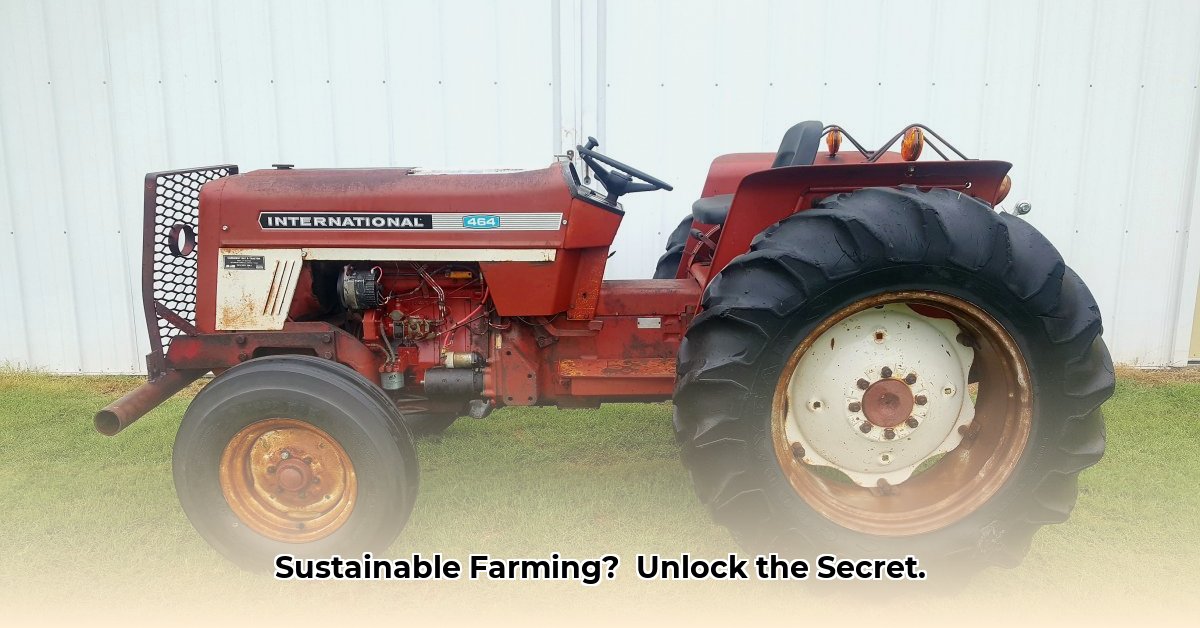
464 International Tractor: A Sustainable Farming Solution
The International Harvester 464 tractor, a classic from a bygone era, offers a surprisingly relevant approach to modern sustainable farming. This vintage workhorse provides a compelling blend of affordability, mechanical simplicity, and environmental consciousness, making it an attractive option for small-scale farmers, homesteaders, and even enthusiastic hobbyists. Understanding both its strengths and limitations is key to harnessing its full potential. This guide will explore its cost-effectiveness, ease of maintenance, suitability for various tasks, and provide actionable steps for prospective owners. For more information on International Harvester tractors, visit this useful resource.
Affordability and Accessibility: A Budget-Friendly Choice
One of the 464's most significant advantages is its affordability. Prices range from roughly $4,500 to $7,000 depending on condition and location, a fraction of the cost of new tractors. This dramatically lowers the barrier to entry for aspiring farmers, particularly those operating on limited budgets. Isn't it remarkable how such a significant cost saving can empower sustainable practices? This accessibility opens doors to a wider range of individuals interested in sustainable farming.
Mechanical Simplicity and DIY Maintenance: Empowerment Through Ease
Unlike modern tractors burdened with complex electronics, the 464 boasts a straightforward mechanical design. This simplicity translates to easier maintenance and repairs, often manageable with basic tools and some mechanical aptitude. This reduced reliance on expensive mechanics saves money and empowers owners to actively participate in their tractor's upkeep, extending its lifespan and minimizing waste. This hands-on approach aligns perfectly with the ethos of sustainable living.
Making Maintenance Easier: A Practical Guide
Regular maintenance is crucial. Here's a simple routine:
- Oil Changes: Follow the manufacturer's recommendations for regular oil changes to ensure engine health.
- Fluid Checks: Regularly check coolant, transmission fluid, and hydraulic fluid levels. Low levels point to potential leaks.
- Belt and Hose Inspection: Visually inspect belts and hoses for cracks or wear, replacing damaged components immediately.
- Engine Cleaning: Regular engine cleaning helps identify potential issues early on and prevents debris buildup.
- Troubleshooting: Learning basic troubleshooting skills will save time and money. Online resources and forums dedicated to the 464 are invaluable.
Limitations: A Realistic Assessment
While the 464 offers many benefits, it's crucial to acknowledge its limitations. Its lower power output compared to modern tractors means it's best suited for smaller operations and lighter tasks. Fuel efficiency isn’t optimal, and finding replacement parts might require some resourceful searching. These factors need careful consideration.
Task Suitability: Matching Tractor to Job
The 464 excels in specific tasks:
- Mowing and Pasture Maintenance: Ideal for managing smaller pastures or fields.
- Light Hauling: Suitable for transporting smaller loads of materials.
- Cultivation on Smaller Plots: Excellent for cultivating smaller plots of land.
- Operating Smaller Implements: Compatible with implements designed for tractors of its size.
Actionable Advice: A Step-by-Step Guide to Ownership
Prospective buyers should follow these steps:
- Thorough Inspection: Before purchasing, conduct a comprehensive inspection for wear and potential mechanical issues. Seek expert assistance if needed.
- Budgeting for Repairs: Factor in potential repair costs; a seemingly good deal can quickly become expensive.
- Matching Needs to Capabilities: Ensure the tractor's capabilities align with your intended tasks.
- Sourcing Parts: Research parts suppliers beforehand – Yesterday's Tractors is a good starting point.
- Community Engagement: Connect with other 464 owners online for invaluable advice and support.
Conclusion: A Niche but Valuable Asset
The International Harvester 464 fills a specific niche within sustainable agriculture. While it’s not a solution for large-scale operations, its affordability, mechanical simplicity, and suitability for certain tasks make it a valuable option for small-scale farmers and homesteaders committed to environmentally conscious practices. Its enduring appeal lies in its simplicity, repairability, and the opportunity it presents for a more personal farming experience.
Resources
- Yesterday's Tractors: https://www.yesterdaystractors.com/Farmall-464-Tractor-Parts.html (and other vintage tractor parts suppliers)
- Online Forums: Search for "International Harvester 464 forum" to find owner communities.